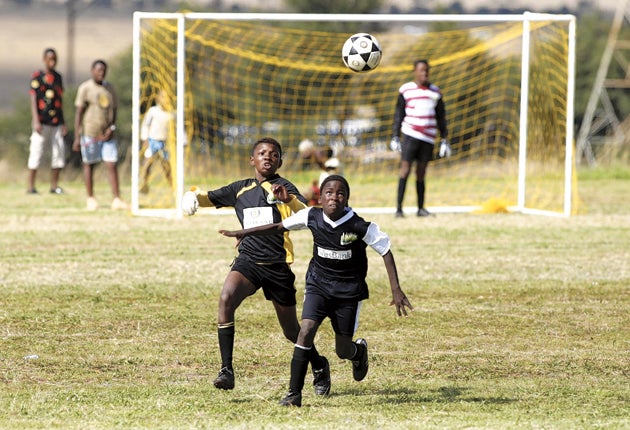The search for a World Cup legacy that can give hope to a nation's youth
South African charity offers football kit 'dreambags' and runs tournaments to help 'keep kids off the streets'

In a dusty township south of Johannesburg, hundreds of excited children play football in a project designed to leave a legacy long after the World Cup circus has moved on from South Africa. Unlike thousands of their peers kicking footballs on scrappy grounds around the country, the children are dressed in pristine kit and many are wearing boots for the first time.
The tournament is organised by Dreamfields, a project founded by well-known broadcast journalist John Perlman, which he hopes will live on as a tangible benefit from the World Cup, immune from questions over vast infrastructure spending in a nation where much of the population remains mired in poverty.
Perlman, 50, dreamed up his project just before the last World Cup in Germany in 2006 as he contemplated the tournament coming to his often troubled nation. "I had this feeling that it is quite hard to stay in a positive space because there are so many things that go on that are complicated. For example the money spent on stadiums is not an unambiguously good thing," Perlman told Reuters.
"The fundamental premise I started from in many ways was that this is a big-hearted country. It is a troubled country with all sorts of divisions and complexes and even paranoias but it is a country with a good heart."
Perlman, using his name and his contacts and exploiting what he calls the "warm following wind" of the World Cup, has shown a genius for persuading big South African corporations – and even small businesses and families – to cough up money for Dreamfields, and to help run the tournaments. Dreamfields, with a small staff of six, expects to have raised 20m rand (£1.78m) by the end of the football spectacular in July. It has already supplied 1,200 schools, representing 16,000 children, mostly in rural areas, with soccer kit, built 12 pitches and organised 96 tournaments.
The recent Orange Farm event was sponsored by the big FirstRand banking group. More than 100 of its staff clearly relished their participation, managing the 25 girls' and boys' teams and providing food, drink, music and trophies. Soccer's world governing body Fifa has its own Football For Hope project but it is designed to teach life lessons in many countries.
Perlman's project, originally based on his previous enterprise of providing books for school libraries, is confined to organising football in South Africa.
However, Dreamfields is linked to other projects, combating crime and drugs or building bridges to dissipate land tensions between rural villages and the national game parks. Its unique nature is built around the supply of £500 "dreambags" which provide enough kit and balls for 15 children in a school. "We start from the premise that playing sport... is a right," said Perlman
"We are having fun and learning how to work as a team," said goalkeeper Katleho Selepe, 12, in a break at the Orange Farm tournament, one of Dreamfields' biggest. "It helps to keep us away from the streets and doing bad things," he said, echoing a frequent theme that football shields youngsters from getting involved in violent crime in the townships.
Selepe's team-mate, striker Tshidiso Matshwisa, 11, said he was wearing boots for the first time. "They fit really well. I am very excited because I want to be a soccer player when I grow up and I will be much better because of these opportunities."
The boys' "manager", bank business analyst Judith Meyer, 21, shared the glow. "It's very different here because you are part of the team and you get to know these boys and girls. You feel like you are doing more than just volunteering for charity work."
Her colleague, risk manager Koketso Dioka, said as he acted as a linesman for a boys' game: "When I was growing up, we played without soccer boots and facilities. Our shoes were too heavy so we had to play barefoot.
"Imagine where everyone would be if they were not here. Most would be doing nothing or bad things," he said.
Perlman admits the next big challenge will be sustaining the project after the momentum of the World Cup has passed. "If you just play when the circus comes to town and you just do things in your country because Fifa has come to town, you don't get anything out of it. Things must continue."
Subscribe to Independent Premium to bookmark this article
Want to bookmark your favourite articles and stories to read or reference later? Start your Independent Premium subscription today.

Join our commenting forum
Join thought-provoking conversations, follow other Independent readers and see their replies